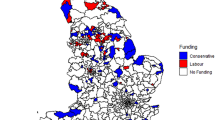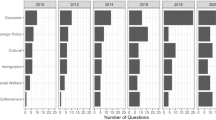Abstract
When parties decide, do voters listen? We argue that the answer depends on voters’ trust in the institutions of American politics. Using both a conjoint experiment and a traditional survey experiment with subjects voting in hypothetical congressional primary elections, we find that respondents from both parties are more likely to support a candidate when that candidate is endorsed by a member of the party or when the candidate has previously served in elected office. However, these findings are conditional on trust and partisanship. For Democrats, we find that support for party-backed candidates erodes among low-trust respondents. Low-trust Democrats are particularly resistant to candidates endorsed by traditional party elites such as Speaker Pelosi, President Obama, and the Democratic Congressional Campaign Committee, and are less likely to support experienced candidates. While low-trust Republicans are more skeptical of endorsements from traditional party actors like Senate Majority Leader Mitch McConnell, the most salient attribute for Republicans is an endorsement from President Trump, which significantly boosted support in both studies independent of trust. Our findings support party-centric theories of primaries but suggest that voter distrust in the political system threatens parties’ control over their nominations.







Similar content being viewed by others
Notes
The replication files for both studies can be found at: https://dataverse.harvard.edu/dataset.xhtml?persistentId=doi:10.7910/DVN/JF3Z7V.
As the Roy Moore example shows, a candidate certainly can have previous political experience without being the party’s preference in a primary.
Respondents from 1964 to 2012 were counted as trusting of the federal government if they indicated they trusted the federal government to “do what is right” most or all of the time. The 2016 version of the question used a five-point scale with respondents coded as trustful if they said the federal government could be trusted to do what is right most of the time or always.
The MTurk HIT was described as a survey on voting in primary elections. In order to qualify for the study, the respondents needed to have at least a 99% Human Intelligence Task (HIT) approval rate and be located in the U.S. We discuss further data quality checks below.
As a robustness check measuring other ways in which distrust can manifest in vote choice, we also included a “wildcard” category in which respondents were randomly assigned to either Special Counsel Robert Mueller, federal law enforcement, corporations/business leaders, local government, or executive branch staff. This additional test allows for additional plausible ways in which distrust can affect vote choice without keeping subjects on this section for an extended period of time. For example, a far-right respondent may distrust what they think of as agents of the so-called “deep state,” perhaps including Special Counsel Robert Mueller or federal law enforcement; or a respondent who is further to the left ideologically may trust the political system but harbor distrust toward corporations and business leaders. These additional results are included in the “Appendix”.
Regardless of which candidate they supported, subjects rated the candidates on a scale from 1, “this candidate would never represent my interests in Washington,” to 7, “this candidate would always represent my interests in Washington.”
Candidate race probabilities were weighted to match nationwide demographic characteristics.
EGAP identification number 20190205AB.
As a robustness check, we tested whether adding a “medium trust” categorization (thus breaking our sample into low-, medium-, and high-trust respondents) changes our results, but the differences between low- and high-trust respondents were very similar to these main results. Those results are presented in Figs. A.16 and A.17 in the “Appendix”.
Abramson et al. (2019), in particular, show that, in some cases, strong preference intensity can outweigh majority preference in the AMCEs from a conjoint design. For example, a small minority of respondents might have a strong preference for male candidates that could overpower a slight preference for female candidates among the majority of respondents.
We altered the design of the trust questionnaire to use a six-point scale rather than a five point scale, which forces respondents to indicate whether they trust an institution to do what is right “more than half” or “less than half” of the time.
Sanders-endorsed candidates were strongly preferred by low-trust Democrats in Study 1, so this design allows us to examine a Sanders effect more directly.
References
Abramson, S. F., Kocak, K., & Magazinnik, A. (2019). What do we learn about voter preferences from conjoint experiments? Working Paper. https://scholar.princeton.edu/sites/default/files/kkocak/files/conjoint_draft.pdf.
Ahler, D. J., Roush, C. E., & Sood, G. (2020). The micro-task market for 'lemons:' Collecting data on Amazon's mechanical turk. Working paper.
Bawn, K., Cohen, M., Karol, D., Masket, S., Noel, H., & Zaller, J. (2012). A theory of political parties: Groups, policy demands, and nominations in American politics. Perspectives on Politics, 10, 571–597.
Berinsky, A. J., Huber, G. A., & Lenz, G. l S. (2012). Evaluating online labor markets for experimental research: Amazon.com’s Mechanical Turk. Political Analysis, 20(3), 351–368.
Cohen, M., Karol, D., Noel, H., & Zaller, J. (2008). The party decides: Presidential nominations before and after reform. Chicago: University of Chicago Press.
Conroy, M., Rakich, N., & Nguyen, M. (2018). We looked at hundreds of endorsements. Here’s who Democrats are listening to. Fivethirtyeight August 14, 2018. https://fivethirtyeight.com/features/the-establishment-is-beating-the-progressive-wing-in-democratic-primaries-so-far/.
Chressanthis, G. A., & Shaffer, S. D. (1993). Major-party failure and third-party voting in presidential elections, 1976–1988. Social Science Quarterly, 74, 264–273.
Downs, A. (1957). An economic theory of democracy. New York: Harper Collins.
Dyck, J. J., Pearson-Merkowitz, S., & Coates, M. (2018). Primary distrust: Political distrust and support for the insurgent candidacies of Donald Trump and Bernie Sanders in the 2016 primary. PS: Political Science and Politics, 51(2), 351–357.
Gilens, M., & Murakawa, N. (2002). Elite cues and political decision making. In M. X. Delli Carpini, L. Huddy, & R. Y. Shapiro (Eds.), Research in micropolitics (6th ed., pp. 15–50). Greenwich, CT: JAI Press.
Green, P. E., Krieger, A. M., & Wind, Y. ( Jerry). (2001). Thirty years of conjoint analysis: Reflections and prospects. Interfaces, 31(3), S56–S73.
Hainmueller, J., Hopkins, D. J., & Yamamoto, T. (2014). Causal inference in conjoint analysis: Understanding multidimensional choices via stated preference experiments. Political Analysis, 22(1), 1–30.
Hassell, H. J. G. (2016). Party control of party primaries: Party influence in nominations for the US Senate. Journal of Politics, 78(1), 75–87.
Hassell, H. J. G. (2018). The party’s primary: Control of Congressional nominations. New York: Cambridge University Press.
Henderson, J. A., Dancey, L., Goggin, S. N., Sheagley, G., & Theodoridis, A. G. (2019). Ideology, factionalism, and electability: Assessing the competing preferences of primary election voters. In Paper presented at the annual meeting of the Midwest Political Science Association, Chicago, IL.
Hetherington, M. J. (2005). Why trust matters: Declining political trust and the demise of American liberalism. Princeton, NJ: Princeton University Press.
Hibbing, J. R., & Theiss-Morse, E. (2002). Stealth democracy: Americans’ beliefs about how government should work. New York: Cambridge University Press.
Huff, C., & Tingley, D. (2015). ‘Who are these People?’ Evaluating the demographic characteristics and political preferences of MTurk Survey respondents. Research and Politics,. https://doi.org/10.1177/2053168015604648.
Kamarck, E., & Podkul, A. R. (2018). Progressives versus the establishment: An updated score. Brookings Institution. Retrieved August 18, 2018, from https://www.brookings.edu/blog/fixgov/2018/08/09/progressives-versus-the-establishment-an-updated-score/.
King, D. C., & Matland, R. E. (2003). Sex and the grand old party: An experimental investigation of the effect of candidate sex on support for a Republican cndidate. American Politics Research, 31(6), 595–612.
Kitchens, K. E., & Swers, M. L. (2016). Why aren’t there more Republican women in Congress? Gender, partisanship, and fundraising support in the 2010 and 2012 elections. Politics and Gender, 12(4), 648–676.
Koch, J. W. (2000). Do citizens apply gender stereotypes to infer candidates’ ideological orientations? Journal of Politics, 62(2), 414–429.
Koger, G., Masket, S., & Noel, H. (2009). Partisan webs: Information exchange and party networks. British Journal of Political Science, 39(3), 633–653.
Kunkel, J. A. (1988). Party endorsement and incumbency in Minnesota legislative nominations. Legislative Studies Quarterly, 13(2), 211–223.
La Raja, R. J., & Schaffner, B. F. (2015). Campaign finance and political polarization: When purists prevail. Ann Arbor, MI: University of Michigan Press.
Leeper, T. J., Hobolt, S. B., & Tilley, J. (2020). Measuring subgroup preferences in conjoint experiments. Political Analysis, 28(2), 207–221.
Manento, C. (2019). Party crashers: Interest groups as a latent threat to party networks in Congressional primaries. Party Politics,. https://doi.org/10.1177/1354068819834528.
Marien, S. (2013). In S. Zmerli & M. Hooghe (Eds.), Measuring political trust across time and space in political trust: Why context matters. Colchester: ECPR Press.
Masket, S. E. (2009). No middle ground: How informal party organizations control nominations and plarize legislatures. Ann Arbor, MI: University of Michigan Press.
McDermott, M. L. (1998). Race and gender cues in low-information elections. Political Research Quarterly, 51(4), 895–918.
McNitt, A. D. (1980). The effect of preprimary endorsement on competition for nominations: An examination of different nominating systems. Journal of Politics, 42(1), 257–266.
Miller, A. H. (1974). Political issues and trust in government: 1964–1970. American Political Science Review, 68(3), 951–972.
Page, B. I., & Shapiro, R. Y. (1992). The rational public: Fifty years of trends in Americans’ policy preferences. Chicago: University of Chicago Press.
Peterson, G., & Mark Wrighton, J. (1998). Expressions of distrust: Third-party voting and cynicism in government. Political Behavior, 20(1), 17–34.
Rogin, A., Verhovek, J., Stracqualursi, V., & Kelsey, A. (2017). Roy Moore defeats Trump-backed Sen. Luther Strange in Alabama GOP primary runoff. ABC News, September 26, 2017. https://abcnews.go.com/Politics/luther-strange-roy-moore-face-off-gop-runoff/story?id=50099146.
Rosenstone, S. J., Behr, R. L., & Lazarus, E. H. (1996). Third parties in America: Citizen response to major party failure (2nd ed., revised and expanded). Princeton, NJ: Princeton University Press.
Sniderman, P. M., Brody, R. A., & Tetlock, P. E. (1992). Reasoning and choice: Explorations in political psychology. New York: Cambridge University Press.
Zaller, J. R. (1992). The nature and origins of mass opinion. New York: Cambridge University Press.
Acknowledgements
We would like to thank Members of the Graduate American Political Workshop at Brown University, discussants and audience members at the 2019 Midwest Political Science Association Meeting, and anonymous reviewers for their invaluable feedback at various stages of this project.
Author information
Authors and Affiliations
Corresponding author
Additional information
Publisher's Note
Springer Nature remains neutral with regard to jurisdictional claims in published maps and institutional affiliations.
Supplementary Information
Below is the link to the electronic supplementary material.
Rights and permissions
About this article
Cite this article
Manento, C., Testa, P.F. In Party We Trust? Voter Support for Party-Backed Candidates in Primary Elections. Polit Behav 44, 1633–1656 (2022). https://doi.org/10.1007/s11109-020-09672-9
Accepted:
Published:
Issue Date:
DOI: https://doi.org/10.1007/s11109-020-09672-9




